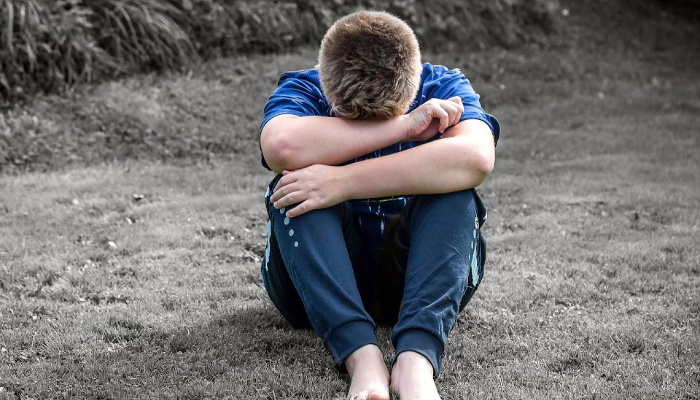
I remember the first time I ever set foot in my Bishop’s office. It was one of the scariest moments of my life. I didn’t know what to expect. I wanted to hide and never be found.
But it’s also when the Atonement of Jesus Christ became real for me.
When it comes to dealing with pornography, I want to be absolutely clear that I am no mental health or relationship expert. I have never been a bishop, and have only held a couple of callings in my life with the youth.
What I have to share today isn’t a result of some multi-year research project that I have advanced. Nor does it come from years and years of study on this particular subject.
I simply speak from experience. From simple observations I have had and thoughts that have occurred to me throughout my life.
You see, in the culture of the Church, it has become apparent that pornography is a big problem, and one of Satan’s most effective tools. The Church has evolved its way of thinking from “how do we prevent people from viewing pornography” to “what can we do to help everyone (which in all reality is almost everyone) who has viewed it.”
Unfortunately, there is a huge gap. A gap where we lose the faith, trust, and hope of those who are affected by pornography use.
The good news is that there is a way to fill this gap. And it really isn’t that hard.
It’s one simple conversation that will completely change the way we “deal with” pornography.
What the conversation is NOT
 For those of you that have never had a problem with pornography, let me try to help you understand what it’s like in our church culture. It may take me a minute . . . I just need to think of one right word that fits the description. I think . . . maybe . . . yeah. I got it.
For those of you that have never had a problem with pornography, let me try to help you understand what it’s like in our church culture. It may take me a minute . . . I just need to think of one right word that fits the description. I think . . . maybe . . . yeah. I got it.
Terrible. Horrific. Unbearable. Choose any of those three.
You may never understand how it is going to church classes, seminary, institute or even activities while you are hiding this secret problem. Each meeting drills a little deeper into your heart, leaving you feeling even more worthless.
And you know what the worst part is? It’s not that we feel out of place and worthless, though that really is unbearable. It’s that we go to these meetings and activities that are supposed to help us find healing and hope, and instead we leave with more depression and shame.
No wonder so many “porn addicts” close off and hide everything. It’s not that they are trying to get away with anything. It’s that WE HAVE LOST ALMOST ALL HOPE IN OUR ABILITY TO OVERCOME IT.
Why? Let me show you.
Warning about pornography
 For starters, we constantly hear about how wrong it is to look at pornography.
For starters, we constantly hear about how wrong it is to look at pornography.
Yes, it is important to understand and warn of the spiritual dangers. I get that. But that seems to be the sole focus of every conversation we have about pornography.
Think of something that you struggle with . . . what is your greatest weakness? Imagine that your best friends and closest family members constantly talk about how terrible it is to do *insert your weakness here.* Every day. Constant reminders.
How effective do you think this is? Yeah, you’re right, it’s not.
Each time a teacher or peer brings up the danger of pornography and all that will happen because of it, we only go deeper into a hole, begging the world somehow to make us disappear forever.
We get it. I promise the problem will not be fixed with just these warnings. Especially if you are simply mentioning them, just to mention them.
Stand-alone promises of hope and healing
 This one is tricky. I hope I don’t confuse anyone when I say that promises of healing through the Gospel are bad. They are actually exactly what we need.
This one is tricky. I hope I don’t confuse anyone when I say that promises of healing through the Gospel are bad. They are actually exactly what we need.
But they need to be made in the right way.
When I struggled, along with the constant warnings given, there were constant promises given that I can get through it. Those promises actually motivated me. I was inspired to try harder.
Related: LDS Church Publishes Four FHE Lessons on Pornography
But then eventually I failed. I would have the problem resurface and all of a sudden those promises were void. Eventually, I just stopped believing them. “Yeah, perhaps there is hope in the Gospel. But not for me. It just doesn’t work.”
And you know all that I had to go back on? A lesson a few months earlier where I found the inspiration. There was no further direction. No guide to how this healing would come. No follow-up or support. Just a promise that it is possible.
Our failures to see the realization of these promises cause us further harm than the help we receive from that little bit of inspiration we find.
I hope that we never stop offering promises that the Gospel really offers. They really do inspire and uplift. But they need to be given in the right kind of conversation.
What the conversation IS
 You’re halfway there. Now you know what NOT to do.
You’re halfway there. Now you know what NOT to do.
Perhaps those principles seemed obvious. Maybe they are new to you. Wherever you fall on the spectrum, I’m telling you that avoiding those two things will make a world of difference in the lives of your friends, family members, and peers.
However, they will only help if you know those things that you SHOULD do to help those that are struggling with pornography.
Here we go. Here’s the big secret. Drum roll, please.
The golden conversation that we need to have about pornography is . . . a conversation.
If you’ve read any of my other articles . . . I will admit that sometimes I am so anticlimactic it is ridiculous.
I get it. Here you are expecting some unknown principle that a crazy life experience taught me, and all I’m saying is that we just need to have more conversation about pornography.
That’s lame. Do you know what the worst part is? Even though it’s so simple, we almost never, ever, like ever use this in the way we deal with pornography.
So yes, I will be anticlimactic, if that’s what I feel a lot of us truly need.
The Perfect Example
 Of course, there is no better place to turn than to Jesus Christ. How does He handle a serious sin or problem with conversation?
Of course, there is no better place to turn than to Jesus Christ. How does He handle a serious sin or problem with conversation?
Think of the woman taken in adultery.
In one of the most tender moments in all of scripture, Christ teaches us not only that He is merciful, but He shows us how we should treat those who may be struggling.
There were the Pharisees, who caught the woman in “the very act” of pornography adultery. Their tactic was to verbally warn of the consequences. “Well, you know what happens to those who are adulterous. They are stoned. It says so in the Law of Moses, which is the law that we are supposed to live by.”
True. They weren’t wrong. But that didn’t exactly instill hope for her, did it?
Then there was Christ. It didn’t matter to Him how true the “warnings” were. It didn’t matter how serious the sin was.
“Woman where are those thine accusers?”
This was much more than just a question about those who were going to stone her. He understood the law. He understood that the accuser was the first to cast the stone. Essentially Christ was asking “What about those warnings? What about all the negative things that were promised? Where are they? Are you actually hopeless? Do you think that you don’t have a chance?”
“No man, Lord.”
This is the moment her life turned around. Not in Christ’s declaration of His mercy. Not in his instruction to sin no more.
It was in the moment that she looked around and discovered for herself that truly this sin could not drag her down to the destruction that she feared was coming.
That made Christ’s promises, and Christ’s instruction so much more powerful and impactful.
Having the conversation
 The power of healing, particularly with extremely destructive sins, comes when the sinner finds hope for themself.
The power of healing, particularly with extremely destructive sins, comes when the sinner finds hope for themself.
Without the conversation that Christ had, the woman probably would not have found hope. He was patient. He waited. He listened. He didn’t preach . . . He talked.
When it comes to dealing with a problem like pornography, we need to have conversations!
I’m not saying that everyone has to gather in a circle and have a big confession one with another. I’m not even saying that we have to ignore the destructive nature of pornography and pretend they won’t affect our spirituality. Nothing could be further from the truth.
But what would happen in a quorum, or a group, or an FHE where the leader asks them about the problems and guilt they are dealing with? What happens when we are not just warned about pornography, but are helped to discover a way past it, step-by-step?
I’ll tell you what happens. All of a sudden you feel supported. All of a sudden the hope you so long to have is real, and there’s a clear path to it.
No longer is pornography a reason why you don’t belong or why you can’t be loved. It’s just a vice that you have real hope of overcoming.
Conversation. Conversation. Conversation.
Talk to them. Ask them. Love them. Relate to them.
Related: Discussing a Loved One’s Addiction
Don’t just tell them why they shouldn’t do it and leave them alone with just a couple of promises of hope. It’ll never work.
Finding sincere hope and healing
 Every person who struggles with pornography longs to rid themselves of the shame and worthlessness that comes with it.
Every person who struggles with pornography longs to rid themselves of the shame and worthlessness that comes with it.
I have talked to more than one bishop about this issue. Each time was terrifying. Each time I felt a little better.
But then I failed again.
I wasn’t able to overcome the problem until I had a bishop who didn’t simply say that I needed to “sin no more.”
He made follow-up appointments with me. He understood the problem would not go away immediately. He knew exactly what I needed to hear.
But that’s only because he gave me a chance to actually talk with him.
The conversation may take different forms. It may have more listening than talking. It may require constant follow-up and support.
But I am telling you it is worth it. By conversing with those who may struggle pornography, and not simply telling them that “being stoned” is the result of sinning this way, you are given them worth and hope again.
Healing and hope can be found in the Gospel of Jesus Christ. But often, we don’t see how.
We need people to help us look around and realize that we actually don’t have any accusers. We need people who help us discover for ourselves the way we can overcome bad habits. We need people who can help us realize that not all hope is lost.
In short, we need conversation, not preaching, that leads towards the Savior.
Please talk with us. We desperately need that kind of help.





